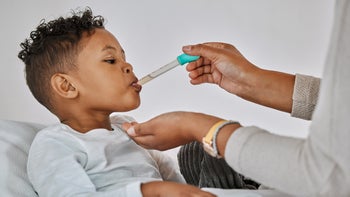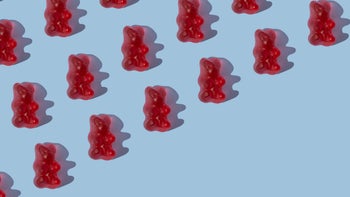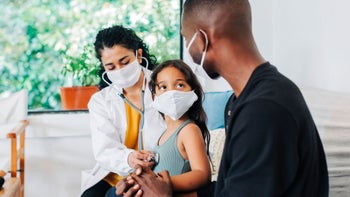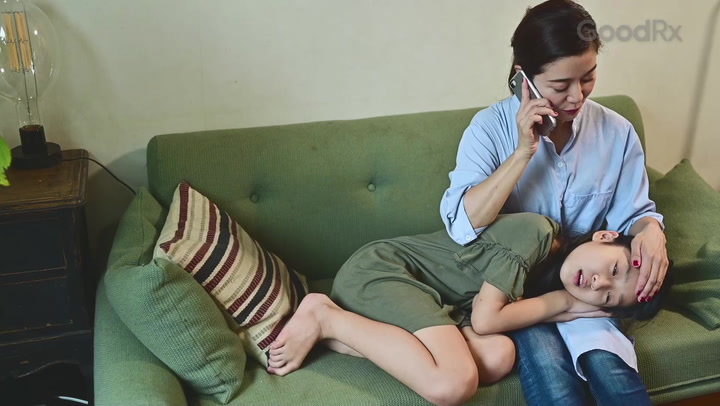
Can I Give My Toddler Over-the-Counter Medication for a Cold?
Key takeaways:
Most experts recommend talking to a healthcare provider before giving your young child over-the-counter (OTC) cold medication.
Many popular cough and cold medications have not been fully tested on young children, so we don’t know all the risks.
OTC cold medications don’t treat the source of a cold — they just cover up the symptoms. That can be dangerous for young children, who could get worse quickly.
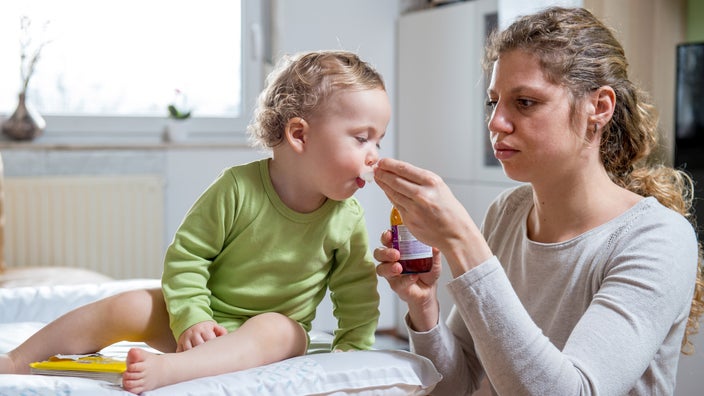
When you have a sick baby or toddler at home, you want to make the right choices for their care. It’s hard to see them feel bad, and after all, a child who is coughing or fussy makes life difficult for everyone.
But where do you start? Your local pharmacy carries dozens of options for dealing with cold or flu symptoms. Should you give them to your baby or young child?
As it turns out, experts say that most over-the-counter (OTC) cold medications should not be given to children under 4 — unless a healthcare professional recommends it. Learn why this is, what the exceptions are, and what you can do instead.
Search and compare options
What are OTC cold medications, and how do they work?
Cold medications help control the symptoms of a viral head cold. We often talk about cold medications by their brand names, but the ingredients in many brand-name medications are the same.
Cough suppressants or antitussives
These medications stop the urge to cough, usually by numbing the throat so you don’t feel like you need to cough. The active ingredients in OTC cough suppressants are:
Dextromethorphan (Delsym, Robitussin 12-Hour Cough Relief)
Menthol (Hall’s Lozenges, Ricola Cough Drops)
Decongestants
Decongestants shrink the lining inside the nose and sinuses. This makes it easier for air to pass through, so you feel less stuffy. The shrinkage also results in less mucous production and drainage.
Active ingredients in OTC nasal decongestants are:
Pseudoephedrine (Sudafed, Nexafed, Zephrex-D)
Phenylephrine (Sudafed PE, Little Remedies Nose Drops, Neo-synephrine Cold+Allergy)
Oxymetazoline (Afrin Nasal Spray, Dristan Nasal Spray, Children’s Mucinex Stuffy Nose Nasal Spray, Vicks Sinex Severe Nasal Spray, Zicam Extreme Congestion Relief)
Read more like this
Explore these related articles, suggested for readers like you.
Remember that decongestants are stimulants, too. So they can wake a kid up!
Expectorants
Expectorants are intended to thin out your drainage so you can cough more easily. The active ingredient in OTC expectorants is:
Guaifenesin (Mucinex)
Antihistamines
Antihistamines are designed to block the natural hormone histamine, which controls allergic reactions. In other words, antihistamines are primarily allergy medications. But some antihistamines also dry up drainage, suppress coughs, and cause drowsiness. The active ingredients in these OTC antihistamines are:
Diphenhydramine (Benadryl, Vicks ZzzQuil)
Chlorpheniramine (Aller-chlor)
Doxylamine (Vicks ZzzQuil Ultra)
Non-drowsy antihistamines, such as loratadine (Claritin), fexofenadine (Allegra), and cetirizine (Zyrtec), don’t have these extra effects. They work well for allergies, but are not helpful for cold symptoms.
Combination medications
Many popular cold medications are sold as all-in-one solutions to a cold. They combine several active ingredients, including many of the ingredients listed above. They also often contain pain reliever/fever reducers like acetaminophen (Tylenol) or ibuprofen (Advil or Motrin).
Popular combination OTC cold medications include:
Children’s Tylenol Cold + Cough + Runny Nose (acetaminophen, chlorpheniramine, dextromethorphan)
Children’s Triaminic Multi-symptom Fever & Cold (acetaminophen, chlorpheniramine, dextromethorphan, phenylephrine)
Mucinex Junior Cold & Flu (acetaminophen, dextromethorphan, phenylephrine, guaifenesin)
Vicks DayQuil Cold & Flu (acetaminophen, dextromethorphan, phenylephrine)
PediaCare Children’s Cough & Congestion (dextromethorphan, guaifenesin)
Are cold medicines safe for toddlers? What the experts say
The American Academy of Pediatrics and other groups of medical experts agree that children under 4 should not take over-the-counter cold medications.
Here are the reasons why the guidelines are what they are.
Any baby who has strong symptoms should be checked by a professional
This doesn’t have anything to do with the cold medications themselves. It has to do with how tricky it can be to tell when a baby or young child is really sick.
Young babies can develop severe infections like pneumonia or meningitis quickly. And since they can’t communicate clearly, it can be difficult to know when their symptoms are going downhill.
Cold medication doesn’t treat the cause of the cold
Head colds are caused by viruses that enter the body and replicate there.
OTC cold medications don’t actually kill viruses. That is, they don’t fight the infection, so they don’t make a head cold better any faster.
Babies are different from adults, and some medications don’t work the same for them
Most of the OTC cold medications sold today were originally tested in adults. There isn’t much data showing they work for young children.
That doesn’t mean the medications don’t work for kids; it just means we don’t really know whether or not they do.
The side effects of some cold medications could be dangerous
Not only are we short on data about how well OTC cold medications work in babies, we also don’t have much data about side effects.
That said, these medications have been used for years, and they have been given to children on many occasions. When researchers looked at medical emergencies linked to cold medications, they found that very few children had problems when the medications were given at recommended dosages.
Combination medications can make it hard to know exactly what you’re giving
Cold medications that contain more than one active ingredient are extremely popular. One challenge with these medications, though, is that you can lose track of what ingredients you are taking. This can lead to doubling-up on certain ingredients, resulting in an accidental overdose.
Acetaminophen is one example. Not only is acetaminophen an ingredient in several combination medications, but it might also be given separately to treat a fever. Too much acetaminophen all at once can be life-threatening.
While this issue applies to both children and adults, it could be a bigger problem for kids. That’s because children have smaller bodies, and less room for error when it comes to medication dosing.
What can you give your toddler for a cold — and when?
There are some situations when you can safely use OTC medications for your baby’s head cold.
If your baby has a fever, or is uncomfortable
Babies older than 2 months who have a head cold, or who seem to be uncomfortable, can have acetaminophen (Tylenol).
Once they are past the 6-month mark, babies and toddlers can take ibuprofen (Advil or Motrin) to treat pain or bring down a fever.
Any baby younger than 2 months old who has a fever should be seen by a medical professional because of the risk of meningitis or sepsis.
If your baby has a stuffy nose
Stuffiness is a common problem in tiny baby noses, and it has two causes: mucous and swelling. For most young children, the best way to help with a stuffy nose is to clear the mucous.
A variety of OTC products are available to help rinse out a baby’s nose. Most of these are gentle saltwater (saline) sprays or mists to melt dried mucous and help thick mucus drain away.
Devices to gently suck away mucous, either with a squeezy bulb or with gentle suction, are another option. These work best when they are used together with nasal saline to make the mucus thinner. One thing to be careful about: If the tip of a nose sucker touches the inside of a baby’s nose, it can make swelling worse — so these products should be used very carefully.
Humidifiers help add moisture to the air, which softens thick mucous and allows it to drain. Although both hot vaporizers and cool mist humidifiers exist, only the cool mist humidifiers are recommended around kids because of the risk of severe burns.
If your baby has a cough
A cough is the body’s natural way of clearing the airway. It serves an important purpose, so suppressing it isn’t always a good idea. Here are some things you can try instead.
A humidifier will help soothe the throat and airways, which can ease a cough.
Toddlers older than 12 months of age can try honey as a natural cough suppressant.
The bottom line
As adults, we often turn to OTC cold medications when we’re not feeling well. But for babies and young children, it’s a different story. Many common OTC medications haven’t been fully tested on little kids, so it’s still not clear if the possible benefits of using them outweigh the risks. On top of that, babies and toddlers with troublesome symptoms need to be checked by a professional to determine if they need stronger treatment.
Why trust our experts?


References
American Academy of Family Physicians. (2020). Choosing wisely: Cough and cold medicines should not be prescribed or recommended for respiratory illnesses in children younger than four years.
American Academy of Pediatrics. (2019). Caring for your child’s cold or flu.
Green, J. L., et al. (2017). Safety profile of cough and cold medication use in pediatrics. Pediatrics.
Smith, S.M., et al. (2014). Over-the-counter (OTC) medications for acute cough in children and adults in community settings. Cochrane Database of Systematic Reviews.

















